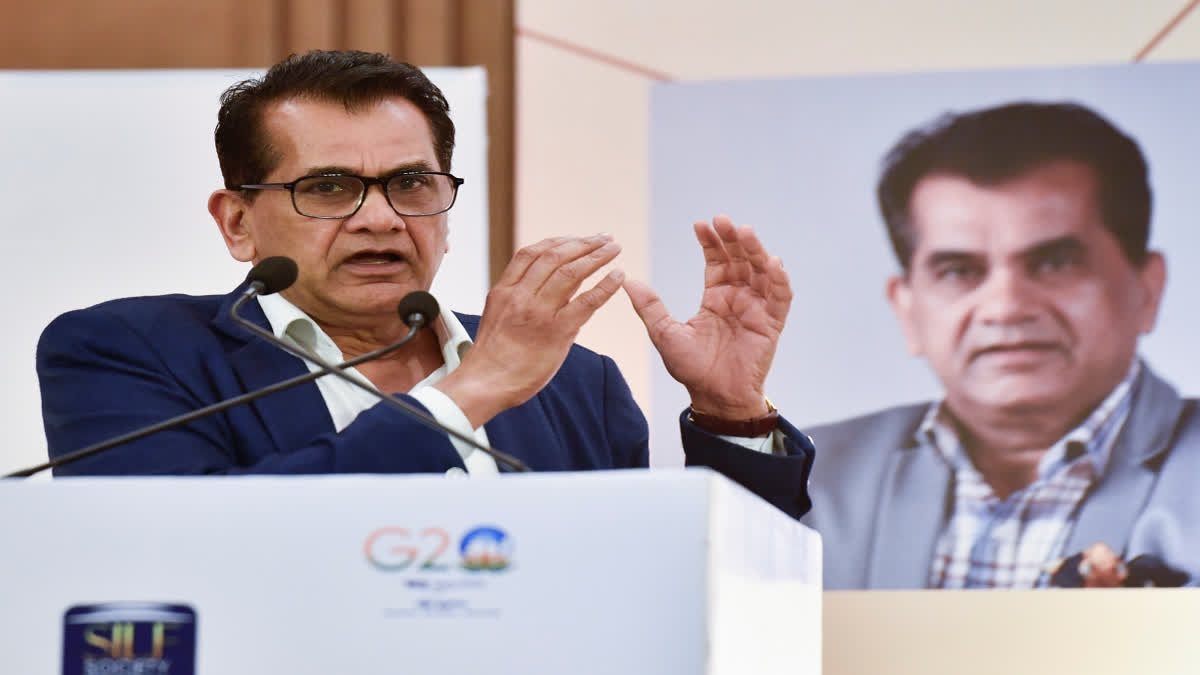New Delhi: "India did an incredible pole vault in Digital Public Infrastructure. We achieved in nine years what would have taken 50 years without DPI", G20 India Sherpa Amitabh Kant said on Monday.
Releasing the final 'Report of India's G20 Task Force on Digital Public Infrastructure' here, Amitabh Kant said, "India did an incredible pole vault in Digital Public Infrastructure. We achieved in nine years what would have taken 50 years without DPI. Today in India, UPI is used at all levels from street vendors to large shopping malls, with the highest percentage of digital transactions globally, accounting for nearly 46 per cent share."
"All these proved to be building blocks for India to steer through the COVID-19 pandemic, be it the transfer of USD 4.5 billion into the bank accounts of 160 million beneficiaries or facilitate distribution of 2.5 million vaccinations in two years with digital vaccine certificates on mobiles. We are far advanced in terms of digitisation and I am confident, this report will be the guiding North Star for the world to follow," added Kant.
The Task Force was led by the Co-Chairs — Amitabh Kant and Nandan Nilekani, Co-founder and Chairman of Infosys and the Founding Chairman of UIDAI (Aadhaar).
The work of this Task Force led to the acceptance of the definition and framework of the Digital Public Infrastructure (DPI) during India’s G20 Presidency and it will be taken forward for implementation during the Brazilian and South African Presidencies. After a successful G20 Presidency and upon the culmination of its tenure, the Report of the Task Force is aimed at strengthening the foundations of DPI worldwide.
According to a government statement, India's G20 Presidency provided a significant opportunity to set and drive the global policy discourse on key economic and developmental agendas. One of the critical enablers for the development and empowerment of people is technological innovations and technology-led economic transformation.
India during its G20 Presidency could steer a strong digital agenda by showcasing India’s achievements in the field of DPI and also could gather unanimous support from all G20 members on DPI-related reports and deliverables under both Finance Track and Sherpa Tracks.
Nandan Nilekani, said, “Governments and businesses around the world are increasingly realising that if they really want to achieve SDGs and social goals like inclusive growth, it has to have underlying DPI to make that happen".
He further noted that DPI has the power to dramatically improve the lives of citizens and transform governance. "It has happened here in India and it started with the Aadhaar ID system, aimed at providing a digital identity to every Indian. Now, around 1.3 billion Indians possess this digital ID and on average 10 million eKYC per day is being facilitated through Aadhar. Meanwhile in payment, UPI facilitates 13 billion transactions monthly, serving about 350 million individuals and 50 million merchants and DPI-enabled direct transfer has saved the government USD 41 billion across central government schemes," added Nilekani.
According to the Finance Ministry, India's digital public infrastructure (DPI) – digital identity, fast payment system along with consent-based data sharing - has demonstrated how 1.4 billion individuals can access socio-economically important services in the field of finance, health, education, e-governance, taxation, skills etc.
This infrastructure is a result of a strong partnership between the public and private sectors, unlocking innovations to address the size and diversity of the Indian population, the Ministry of Finance highlighted in the report.
"Such digital highways can significantly improve the productivity of private and public sectors alike in both advanced as well as emerging economies and benefit citizens across the world to achieve higher and sustainable growth," it noted.



